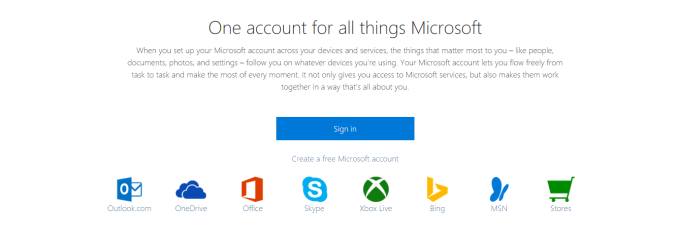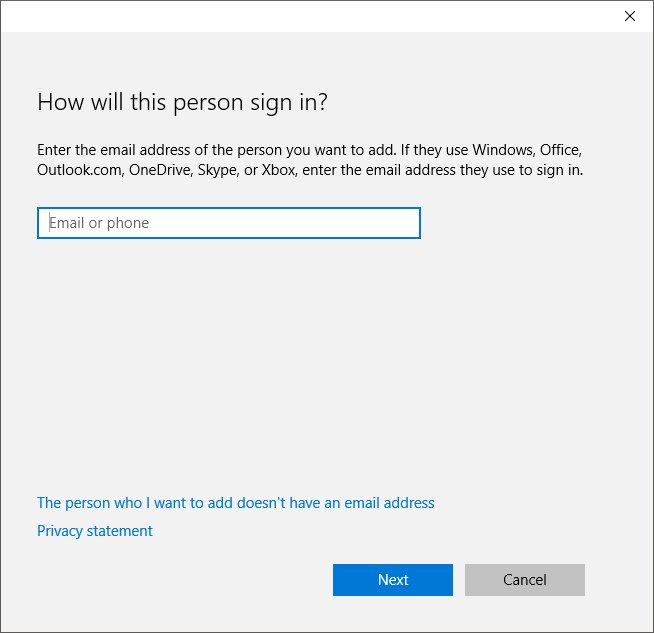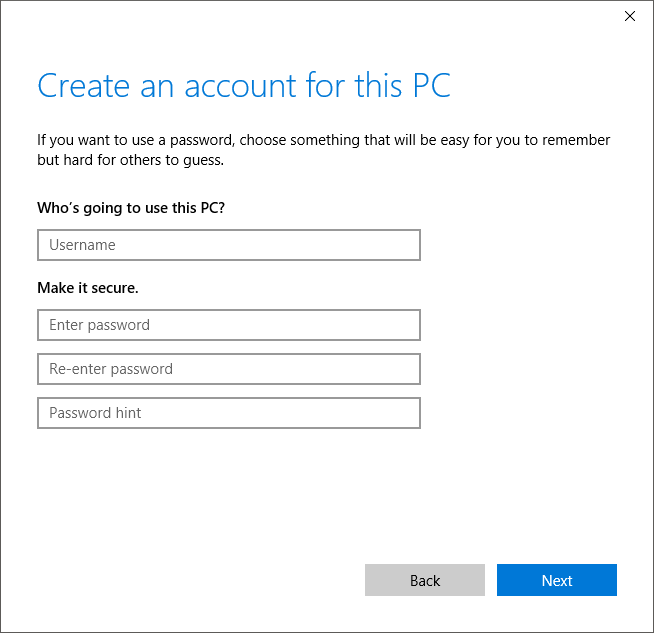The Windows 10 Review: The Old & New Face of Windows
by Brett Howse on August 25, 2015 8:00 AM EST- Posted in
- Operating Systems
- Microsoft
- Windows 10
Why Do I Need a Microsoft Account?
In all versions of Windows up to and including Windows 7, you would create a local account on the computer with a username and password, and log in. Business customers could also have an Active Directory domain, which would allow workers to log in with one set of credentials on any approved domain joined workstation.
Windows 8 introduced the construct of logging into Windows with a Microsoft Account. Logging in with your online profile for Microsoft would then also log you into all of the online services, such as OneDrive for cloud storage, Skype for messaging, and email through outlook.com or Hotmail. Other services, such as weather, could sync your favorites across devices. It also allowed you to optionally sync your computer layout across devices, so your desktop wallpaper, theme, and even your Start Screen layout could all by synchronized across any Windows device you logged into. Also, any password changes would be synchronized as well.
There is certainly people who do not want this though, and Windows 8 made it very difficult to use the Microsoft services if you were not logged in with a Microsoft Account (MSA). During initial setup, the default prompt is to set up the computer with a MSA and although you could bypass this step and create a local account, it was somewhat non-obvious.
For Windows 10, Microsoft has backed off on this somewhat. During setup, the local account option is still not the default, but it is more obvious that you can bypass the MSA login. Most of the built in apps also support login individually rather than at the system level, which gives you the option to log into those services individually if you want to use them, or you can use multiple accounts for things like Xbox in case you have a different profile for that.
Adding a user defaults to MSA but you can choose the link at the bottom to switch to Local Accounts
I think they have found a much better balance with Windows 10 in this regard. Local accounts can now be used without really forcing you to use a MSA for everything. You will lose some features, such as Cortana, if you don’t use a MSA, so it’s not 100% the same but for the people who don’t want to log in with a MSA this is maybe just the way they want it.
So do you need a MSA to use Windows 10? If you want the best and easiest experience, then yes you should use a MSA for Windows 10. You will get the features that we have come to expect from modern systems such as the ability to sync passwords, themes, and more. Hopefully Microsoft will bring back the ability to sync the Start Menu layout like it had in Windows 8 as well, at least as an optional toggle. Windows 10 leverages cloud services for a lot of the functionality, and in order to use these services you have to be logged in. It’s certainly not anything most people are not accustomed to with the rise of smartphones, but there are certainly going to be desktop users who prefer to not log in with their online profile, and for those people they should find the experience a lot better than Windows 8.













293 Comments
View All Comments
zman58 - Thursday, October 15, 2015 - link
"worlds largest and most obnoxious spyware"We really don't know exactly what data it sends back on the user and their system(s) do we? The EULA does not detail this for us. In fact, the EULA has you agree to whatever they desire from your system--for improving the product. The spyware option is purely opt-out, for those of us who know what opt-out means and are capable of figuring out how to opt-out.
Then once you can/do opt-out, how can you be assured you will remain opted-out through upgrades, hot-fixes, patches, and what-not?
Bottom line is that the vendor decides what and when they want to collect data from your system, you have absolutely no control over them. Read the EULA and consider what it means before you click "I agree". You might not want to click that button...
Perhaps using an alternative reliable, safe, secure, and private operating system might be a better approach. ...Well hello there Linux.
bs grinder - Tuesday, December 26, 2017 - link
thanxjohn
ddriver - Wednesday, August 26, 2015 - link
"The privacy concerns are certainly not overblown, but for most people, they will make the trade-off of less privacy if it means an improved experience. The textbook example here is advertising, where in order to deliver relevant ads to the user"Ah yeas, I bet the whole world rejoices being able to give up their privacy to be blasted with ads. It is a great trade-off indeed.
"If you are concerned, the best thing to do is to read the privacy statement and adjust your settings accordingly."
I bet that's the best you can do, pretending that somehow clicking a button or two magically makes all problems go away
Also, I see a catch in those "privacy settings". You seem to only be able to turn off "sending MS info", but that doesn't imply that data is still not being mined and sent anywhere else.
imaheadcase - Wednesday, August 26, 2015 - link
You are aware these settings are present in almost almost win OS? The only privacy stuff they collect is related to MS services, onedrive, etc. Just because win 10 gave people options (gasp!) vs win 8 and 7 does not mean those did not, and still do have it.ddriver - Wednesday, August 26, 2015 - link
No they are not. Especially if you bother to watch what updates you install. For example, MS will try to sneak in the "telemetry" data miner service on your windows 7 as an update, but it is not there to begin with.I haven't used and will likely never use a windows version after 7, but in a "clean" windows 7 install none of the win 10 invasions of privacy are present. It doesn't keylog, it doesn't listen to speech, it doesn't analyze text or file content and it doesn't report everything you do back home.
Oh, and you can also chose not to install certain updates, whereas with the "nice free" windows 10 MS get to deploy on your system whatever it wants - all in the name of your comfort.
Michael Bay - Wednesday, August 26, 2015 - link
Your religious belief in 7 is amusing, at least.ddriver - Thursday, August 27, 2015 - link
If anyone around here is a believer, that is you, believing MS are trustworthy that is.Gigaplex - Friday, August 28, 2015 - link
If you don't trust MS, you shouldn't be using any version of Windows.althaz - Thursday, August 27, 2015 - link
FYI: Windows 7 collects telemetry by default. It was turned off by default in Vista and XP, but most OEMs turned it on for you. So Win 10 is collecting the same information as Windows XP, Vista and 7 (and 8), for most people.yuhong - Friday, August 28, 2015 - link
Does Win10 really "keylog" outside of search boxes and the like? search suggestions are not new either. There is no evidence that Win10 can read arbitrary files either.